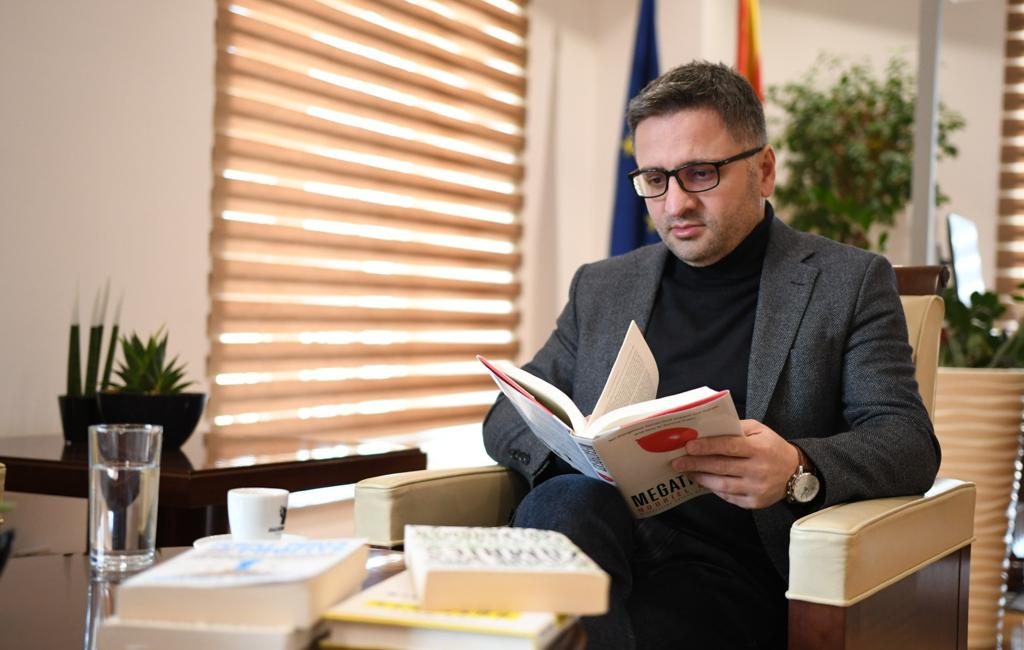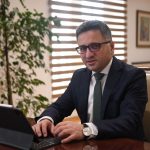30th December 2022, Skopje – The last column for this year is dedicated, as expected, to 2022 and the economic challenges we confronted, as well as 2023 expectations, a year we all welcome with hope and optimism for better days and prosperity. Past three years have shown the world and all of us that we have taken many things for granted, such as the free movement, the cheap energy and the food. The recent developments have been a valuable lesson for the present, but also the future, generations. The pandemic has taught us how fragile the nature of certain economic sectors is and how important it is for businesses to know how to restructure and survive. Energy crisis has demonstrated the significance of the energy independence, the investments in production capacities, the orientation towards renewable energy, as well as the energy efficiency and the rational use of resources we have at our disposal. Global inflation has displayed the importance of developing own production, in particular as regards commodities, coupled by investments in sustainable agriculture. Strategic priorities, such as health security, food and energy, came to the surface, with peace remaining to be the most important value of the development of the civilization, which should not be taken for granted, but rather kept and nurtured on continuous basis. Lessons learned have always been part of the solution, since the first step is to become aware thereof, with the second one being actions taken thereupon.
Uncertainty is the Major Challenge to the Global Economy
Non-economic factors continued dictating the global economy in 2022, from supply chain bottlenecks – consequences from the pandemic, to the war in Ukraine and escalating conditions on the energy market. All these factor caused for global growth to slow down this year, while inflation reached its highest rates in recent decades. Perhaps the major challenge amid the entire crisis is the uncertainty. Uncertainty is probably what weighs heavily on the investors and the households in their decision making, and it is also has impact on the more precise forecasting by the international financial institutions.
2022 global economy is expected to sharply slow down compared to 2021. International Monetary Fund projected growth to slowdown from 6% in 2021 to 3.2% in 2022. Challenges are expected to continue in 2023 as well, with global growth slowing to 2.7%. These are the lowest projections since 2001 onwards, except for 2020 – the year of the pandemic. The projections reflect the slowdown of the USA economy and the EU economy in the first and the second half of the year respectively, as well as the new waves of COVID-19 in China. Around one third of the economies worldwide registered negative economic results in two consecutive quarters, while global inflation significantly accelerated, expected to double in 2022, reaching 8.8%.
EU expects Rebalancing of the Energy Market
Speaking of our major trading partner, the European Union, according to the latest European Central Bank’s December projections for the Eurozone, GDP expectations are improving, however inflation expectations are more pessimistic. Stronger GDP expectations are a result of the performance during the summer months, owing to the boost to services activities. However, energy crisis, high inflation, heightened uncertainty and global economy slowdown, as well as tightening of the financial market conditions, caused for sharp slowdown of economic activity in Q3 2022. Consumer and business confidence is falling, while price developments continue to erode the real disposable incomes and the consumption.
Still, energy market is expected to rebalance over the medium term, i.e. reorienting to alternative sources of energy. Uncertainty will gradually recede, while real incomes will improve, supply chain bottlenecks will fade, with demand strengthening, contributing to the expected full recovery of the economy. Labour market is expected to remain resilient throughout the whole period. GDP in 2022 is expected to grow by 2.4%, slowing down to 0.5% in 2023, then rebounding to around 2% in 2024 and 2025 respectively. Compared to ECB’s September projections, these are more optimistic one. As per the inflation projections, it is expected to decline from 8.4% to 6.3% in 2023, dropping to 2.3% in 2025.
As a Small Economy, We were not Immune
Our economy was not immune to what was happening worldwide. As a small and open economy dependent, above all, on the developments and the trends in the EU, we easily absorbed the effects of the developments in these economies and their markets. Although the start of the year was relatively favourable, coupled with 3.2% growth in the first half, its slowdown was recorded in Q3, when it grew by 2%. Accordingly, for now, economic growth of our economy this year is 2.7% Analyzed by sectors, such result stems from the positive performance in both the services and the agriculture sectors. Following the end of the pandemic, trade, hospitality industry and transport experienced strong growth. According to the expenditure approach of GDP equation, domestic consumption, as well as gross investments, surged.
Ministry of Finance expectations for 2022 are that growth will account for 2.7%, accelerating to 2.9% next year, with an average growth of 4.6% in the period 2023-2027 as per the baseline scenario. In the medium term, we expect to achieve the desired rates of accelerated economic growth by implementing the Growth Acceleration Plan and the Public Investment Plan. Inflation will slow down next year, as actually expected by all relevant international and domestic financial institutions, in line with the projections of stabilization of prices of primary commodities, returning to the historic rates of around 2% in the medium term.
A System to Deliver Higher Economic Growth Rates
If I am to sum up in just few lines and explain the functioning of the fiscal policy this year, I will underline that it was aimed at supporting both the citizens and the businesses, and maintaining macroeconomic stability. We adopted sets of anti-crisis measures worth EUR 750 million to support the citizens and the businesses in 2022. Moreover, we remained committed to gradual fiscal consolidation. We remained committed to creating SMART finances system, a system to deliver higher economic growth rates in the medium and the long run. Significant public finances reforms were implemented, recognized in all IFI’s reports. We act towards sustainability of public finances, laying the foundations of sound practices to be guidance for a longer time period.
We are already living the future, with each new year marking a new beginning. Reviewing the activities together with the Ministry of Finance team, as a typical activity, we have walked a long road, but there still a distance to go. I believe in us, the citizens and the economy. I believe in building a better system, a system to produce better living conditions. I believe in investing in our citizens, the youth and their capacities, as well as in boosted productivity and competitiveness of our economy. I believe we can thus walk alongside many other economies now considered to be more developed. What is needed is consistency, so as to be more competitive and deliver more. I believe we will successfully advance to full membership in the European Union and opening perspectives for a better living standard and better quality of life for our citizens.
At the close, I would like to thank all those working hard in the past year, believing in a better system, better living standard and life for us all. Race right before crossing the finish line might look the most challenging, but it is then that the winners emerge.
















